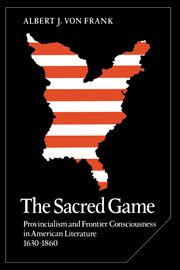Book contents
- Frontmatter
- Contents
- Dedication
- Preface
- Introduction: provincialism and the frontier
- 1 “But enmity this amity did break”
- 2 Brother Jonathan
- 3 “A musy in the thicket”
- 4 Geoffrey Crayon and the gigantic race
- 5 Hawthorne's provincial imagination
- 6 Working in Eden
- 7 Life as art in America
- 8 Reading God directly: the morbidity of culture
- Postscript: tradition and circumstance
- Notes
- Index
4 - Geoffrey Crayon and the gigantic race
Published online by Cambridge University Press: 07 October 2011
- Frontmatter
- Contents
- Dedication
- Preface
- Introduction: provincialism and the frontier
- 1 “But enmity this amity did break”
- 2 Brother Jonathan
- 3 “A musy in the thicket”
- 4 Geoffrey Crayon and the gigantic race
- 5 Hawthorne's provincial imagination
- 6 Working in Eden
- 7 Life as art in America
- 8 Reading God directly: the morbidity of culture
- Postscript: tradition and circumstance
- Notes
- Index
Summary
My brain is filled, therefore, with all kinds of odds and ends.
– Geoffrey CrayonThe conservative struggle of American artists against provincialism was the complementary reverse side of the liberal campaign for a national literature. These two strong motives, with their respective psychological and political implications, relate to each other as the positive and negative prints of a photograph; that is to say, from opposite grounds they project the same image: the prospective fulfillment (even to “perfection”) of the postponed cultural significance of America. This intimate relation through all the wide and fundamental differences is most apparent in the seeming contradictions and inconsistencies in the cultural pronouncements of American artists. Given the coincidence of the projected image, it is often difficult to distinguish between the literary nationalist, with his grudge against history, and the provincial Anglophile who wants nothing more than to have history reassert itself.
One finds a bona fide conservative such as Washington Irving, for example, a man temperamentally disposed to admire the traditions of Europe, intermittently attracted to the antihistorical myth of the new beginning. One finds, for another example, a man of liberal outlook, such as James Russell Lowell, typically contemptuous of European influence in America, speaking nostalgically of “…that Old World so strangely beautiful / To us the disinherited of eld.”
- Type
- Chapter
- Information
- The Sacred GameProvincialism and Frontier Consciousness in American Literature, 1630–1860, pp. 61 - 78Publisher: Cambridge University PressPrint publication year: 1985

